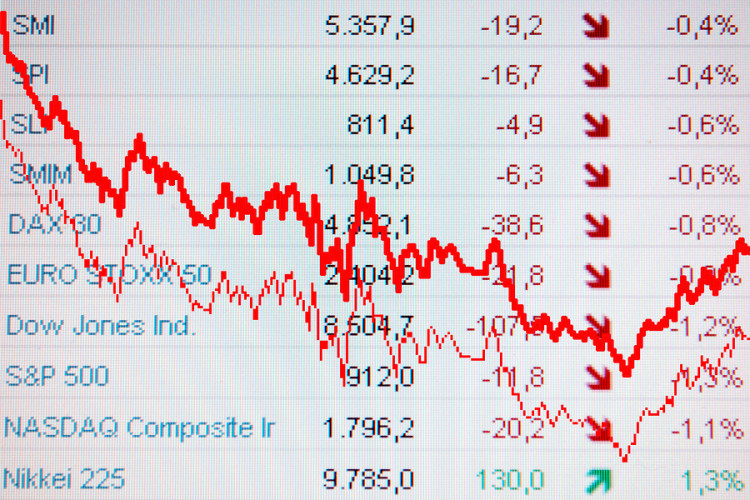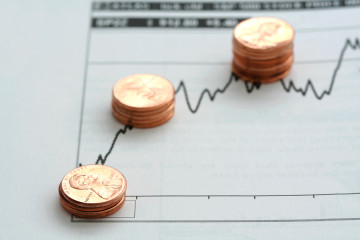U.S. Stocks Slump Ahead of Fed, BOJ Meetings; Haven Assets Climb

published Jun 13th 2016, 5:09 pm, by Inyoung Hwang and Joseph Ciolli
(Bloomberg) —
U.S. stocks and oil slumped, benefiting haven assets such as gold and the yen, as investors grew increasingly cautious ahead of key central-bank meetings this week and Britain’s vote on its membership of the European Union, due later in the month.
Technology and bank shares contributed the most to losses in the S&P 500 Index, as the U.S. benchmark posted its worst three days since February. A six-day rally in a gauge that tracks equity volatility indicated a surge in demand for protection. LinkedIn Corp. soared 47 percent after Microsoft Corp. said it plans to buy the networking company. The yen jumped versus all but one major peer, while gold rose to its highest price in a month. Oil fell to a one-week low, while the pound extended losses after new polls indicated support for the U.K. leaving the EU was pushing ahead of that for remaining in the bloc.
Financial markets have struggled over the past week as investors reassess lackluster global economic signals and concerns mount over the potential fallout from a June 23 referendum that will determine Britain’s future within the EU. Risk assets have lurched on the outcome of ‘Brexit’ opinion polls over the past two sessions, as traders place increasing importance on the vote outcome. Monetary policy reviews from the Federal Reserve and Bank of Japan this week will also be scrutinized for clues as to the timing of U.S. interest-rate increases and potential expansion of Japan’s record stimulus efforts.
For more analysis and news on Britain’s referendum, click here.
“Concern is lingering about the continued effectiveness of central banks, global growth and worries of deflation,” said Matt Maley, an equity strategist in New York at Miller Tabak & Co LLC. “Everybody’s going to be focused on the Brexit vote, but they have to keep an eye on the other issues as we move forward. People are trying to get a feel before Wednesday about the real possibility of a July rate hike.”
Stocks
The S&P 500 fell 0.8 percent to 2,079.06 as of 4 p.m. New York time, its lowest level in almost three weeks. As anxiety levels tick up ahead of the series of potential market catalysts, the CBOE Volatility Index jumped 23 percent Monday to 20.97, bringing its two-day surge to 43 percent, the steepest back-to-back surge since Aug. 24, the day before the swoon that marked trading last northern summer bottomed out.
Microsoft sank 2.6 percent on news of the LinkedIn deal along with other Internet companies, while Twitter Inc. rose 3.8 percent to snap a four-day retreat. Facebook Inc. slipped 2.3 percent. Mining shares were the biggest decliners on the S&P 500, dropping 1.3 percent.
The Stoxx Europe 600 Index slipped 1.8 percent, led lower by banks. G4S Plc declined 5 percent after confirming that the man suspected of killing 50 people and wounding 53 others in a mass shooting Sunday in Florida was an employee since 2007.
The MSCI Emerging Markets Index slipped 1.7 percent, its biggest one-day loss since Feb. 11, as shares from China to eastern Europe decreased.
The Shanghai Composite Index lost 3.2 percent Monday as trading resumed following holidays and the Hang Seng China Enterprises Index in Hong Kong fell 2.4 percent, down 4.5 percent over two days. Stocks fell even as Chinese factory and retail-sales data added to evidence that the world’s second-largest economy is stabilizing.
Futures on Asian indexes signaled further losses for Tuesday, with the yen’s gains sending contracts on the Nikkei 225 Stock Average down 2.3 percent in Chicago. Futures on the Kospi index in Seoul fell 0.2 percent, while those on the Hang Seng and the Enterprises gauge were down at least 0.4 percent in most recent trading.
Currencies
The pound pared losses to 0.1 percent Monday after falling as much as 1 percent to $1.4116, its weakest level since mid-April. Sterling slumped Friday after an Orb/Independent newspaper poll showed 55 percent support for the “Leave” campaign, and 45 percent for “Remain.” While polls over the weekend indicated the race remained tight, three new surveys published Monday showed the campaign to leave the EU had opened up a five percentage-point lead over that bidding to stay.
Hedge funds and other large speculators are betting on declines in sterling futures by the most since June 2013, a report from the Commodity Futures Trading Commission showed. While the odds of ‘Brexit’ coming to fruition are rising, the probability of staying in is still more than 65 percent, according to Number Cruncher Politics and Oddschecker.
The yen advanced 0.7 percent versus the greenback and was near its strongest level since February 2013 against the euro. The BOJ should expand monetary stimulus as soon as this week by boosting bond purchases rather than pushing interest rates further into negative territory, Nobuyuki Nakahara, an influential adviser to Prime Minister Shinzo Abe, said in an interview on Friday. Most economists see the BOJ standing pat on policy this week.
The Bloomberg Dollar Spot Index, a gauge of the greenback against 10 major peers, slipped less than 0.1 percent after rising more than 1 percent over the previous two sessions. Odds of an increase in U.S. rates don’t exceed 50 percent before December, according to Fed funds futures tracked by Bloomberg. There is zero chance of a move on Wednesday, the data show.
Bonds
U.S. Treasuries due in a decade advanced for a fifth day, pushing yields down three basis points, or 0.03 percentage point, to 1.61 percent. Rates on similar-maturity Japanese debt dropped to as low as minus 0.165 percent on Monday, while U.K. yields fell to 1.21 percent.
German government bonds are in “bubble territory” and Allianz SE plans to raise its corporate debt holdings, Chief Investment Officer Andreas Gruber said in an interview. Yields on 10-year bunds dropped below 0.01 percent on June 10, the lowest point on record, and were little changed on Monday.
The Markit iTraxx Europe Index tracking credit-default swaps on investment-grade companies rose to a nine-week high, climbing four basis points to 81 basis points. A measure of swaps on junk-rated corporate issuers surged 15 basis points to 346 basis points, the highest level since March 10.
Commodities
The Bloomberg Commodity Index trimmed an advance after climbing as much as 0.7 percent. It close up 0.2 percent as copper and aluminum surged more than 1 percent, while oil retreated.
Gold for immediate delivery jumped 0.8 percent to $1,283.86 an ounce. A vote in favor of ‘Brexit’ could propel prices to as high as $1,400, analysts at Capital Economics Ltd. said in a report on Friday.
West Texas Intermediate crude slid 0.4 percent to $48.88 a barrel after Baker Hughes Inc. data on Friday showed that rigs targeting crude in the U.S. rose by three to 328 last week, capping the longest run of weekly gains since August. Brent fell to $50.35 in London.
–With assistance from Taylor Hall, David Goodman, Stephen Kirkland, James Herron, Alan Soughley, Neil Denslow, Eddie van der Walt, Anooja Debnath, John Shipman and Emma O’Brien. To contact the reporters on this story: Inyoung Hwang in New York at ihwang7@bloomberg.net ;Joseph Ciolli in New York at jciolli@bloomberg.net To contact the editors responsible for this story: Jeremy Herron at jherron8@bloomberg.net ;Emma O’Brien at eobrien6@bloomberg.net
COPYRIGHT
© 2016 Bloomberg L.P







No Comment